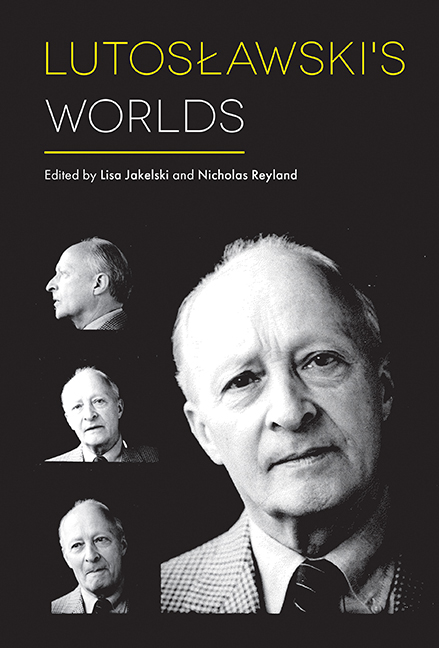Introduction
Published online by Cambridge University Press: 14 June 2019
Summary
Witold Lutosławski – arguably Poland's finest twentieth-century composer – persistently denied the existence of any kind of relationship between his compositions and the circumstances of their creation. Moreover, he sought to exert authorial control over the critical discourses surrounding his creative output, effectively stifling any investigation that questioned the validity of his denials. Problematically for musicians and academics interested in such matters, he was largely successful in this venture. For instance, his heated exchange with critic Tadeusz Kaczyński about the climax of the Cello Concerto (1969–70) is the stuff of legend in Lutosławski studies. A regular interviewer, Kaczyński consistently attempted to provoke his friend Lutosławski into some kind of confession about the links between the dramas of his works and the dramas of his life in the wider world, and the Cello Concerto seemed to offer particularly fertile ground for such revelations. Kaczyński described the culmination of this theatrical concerto – eleven stinging orchestral sonorities from which the soloist retreats with wounded gestures – as a rebellious soloist receiving a beating from an authoritarian ensemble. Lutosławski, true to form, rebuffed Kaczyński's probing. He vehemently halted the discussion of the Cello Concerto in its tracks, exclaiming: ‘I must immediately use the reins of this galloping imagination!’ The exchange with Kaczyński was no outlier.
Lutosławski's allegiance to modernist (ultimately, Romantic) notions of autonomy put him in good company in the larger landscape of twentiethcentury art-music composition. The post-war serialists were famously prickly when it came to discussing musical meaning; in cold-war Budapest, György Kurtág, like Lutosławski, sought to distance himself from a flawed, quotidian reality. Recent scholarship, however, has started to interrogate these views.
Concepts such as an easily separable ‘life’ and ‘works’, for example, were reappraised during critical musicology's rethinking of music as cultural text in the 1990s and 2000s, which demonstrated – surely incontrovertibly – that the values of individuals and communities can be represented, intentionally or otherwise, by symbolic practices such as composing and, indeed, the myriad additional forms of musical activity surrounding and engaged in by composers. The infusion of anthropological and sociological perspectives into musicology is having equally transformative effects, further facilitating an understanding of music making as a socially contingent form of cultural production.
- Type
- Chapter
- Information
- Lutoslawski's Worlds , pp. 1 - 12Publisher: Boydell & BrewerPrint publication year: 2018

